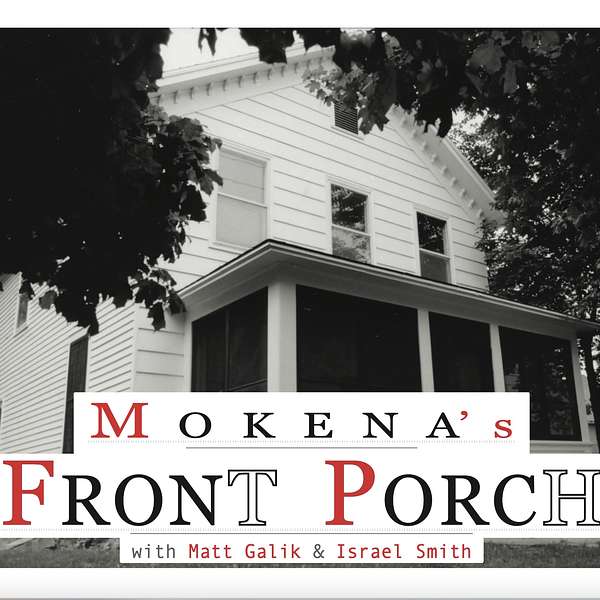
Mokena's Front Porch
This is THE Mokena podcast, with a focus on history and community! A Chicago Suburb of 20,000+, Mokena started as a farming community that grew up after the Rock Island Train line was built through the middle of what would become downtown Mokena in 1852. Follow our website at MokenasFrontPorch.com or on social media!
Matt is a lifelong Mokenian and local historian with 2 books about Mokena as well as a Mokena history blog, Matt's Old Mokena. Many of our episodes are based on the Matt's work collecting the history of our Village.
Israel grew up learning history and real life stories from his WWII grandfathers. His family moved to Mokena in 2016 and live in one of Mokena's Downtown homes that was built in 1916. Getting to know Matt along with Mokena and it's history, Israel worked to make the podcast a reality, through technical challenges and being a first time podcaster. He is a BIG fan of Mokena!
Mokena's Front Porch
Al Braun; The Last of The Blacksmiths - 40 Years of Fixing
The Brauns were a family of blacksmiths in Mokena, going all the way back to the 1880's, all the way into the 1950's! Al Braun was said to be one of the last working blacksmiths in the State. Al always welcomed neighborhood kids, who would enjoy all of the action going on in his shop.
Al Braun also served as a Village Trustee for 33 years and was very active in the community. Matt shares some of his story and how significant he was to the community. A blacksmith was not a luxury in the earlier days of Mokena, it was a necessity. As an all around repair man, horse shoer, wagon wheel repair man, and fabricator, the blacksmiths fire was the answer to many Mokenians problems.
Enjoy hearing some of Al Braun's long Mokena story.
Be sure to check out our website @ www.MokenasFrontPorch.com
Follow Us On Facebook At Mokena's Front Porch
Check Out Our YouTube Channel For Some Great Videos
Find Matt's Blog here: Matt's Old Mokena
Photo & Artwork Credit: Jennifer Medema & Leslie V. Moore Jr.
Do you have a question, comment or maybe an idea for an episode, you can email us at:
Podcast@MokenasFrontPorch.com
Welcome to Mokena's Front Porch a Mokena history podcast with Matt Galick and me, israel Smith. All right, matt. Tonight we're going to talk about the story of a local Mokena blacksmith, Al Braun. Yeah, al Braun. So tell us a little bit before we get into the story. Where was his blacksmith shop located?
Matt:Yeah, so Mr Brown's blacksmith shop was on front street. Uh right, exactly where uh resales for rescue is nowadays the uh the gnaws resale shop, or where some of our uh residents who have been around here uh quite a long time would remember the post office, having been here yeah, and what year?
Israel:what years are we talking about here?
Matt:so this piece, uh, that I had had, or had written, and it was on the blog, was, uh, focused on a gentleman by the name of albert brown, or l brown, and he was in business there from about 1903, 1904, right up to the end of the 1950s. So he was in business there for quite a long time, although his father, henry Brown, who was also a blacksmith, had been there as far back as the 1880s in a different building.
Israel:And clearly to a town. At this time, a blacksmith was a huge need. There was a huge need for him to fix things, and that's all.
Matt:Sure.
Israel:What kind of things did people expect of the blacksmith All?
Matt:kinds of stuff. If it was a metal or iron work he could fix it. He was a big part of his business. Mr Brown's business was the shoeing of horses A big part of his business. Mr Brown's business was the shoeing of horses. People would take their horses to a shop where they would be shod. As well as Mr Brown, he had a heart for children too the Mokena kids and they all knew that if something ever went, wrong with a bike or a younger child like a tricycle.
Israel:They could take it to him and he'd be able to fix it. And then, uh, before we get into the story, talk for a little bit of context. Who are some of his neighbors and uh fellow shop owners at the time that we would know from from the stories we've talked about?
Matt:Yeah, let's see here here. Uh, he was in business, or he opened up uh, his own business right around the same time that frank hirsch had opened his uh, his saloon on front street, which of course, as we know, is in the same building that little l's is in nowadays. Uh, he was uh in, let's see who else was uh was going. He would have been in business at the same same time as the Zumstein general store, which stood in the historic building where uh curtain call is nowadays the old Kerber pharmacy.
Matt:Uh, he was also a contemporary of uh let's see who else is, like all these, all these people trying to come in the door at once. He would have been a contemporary of a gentleman by the name of Richard Hensel, who was a pharmacist in town who would later go on to establish a pharmacy in the Zumstein building which I just mentioned. But around this time Mr Hensel was just leaving his pharmacy in the building on the northeast corner of Front and Mokena streets. So these were all people that he would have known in his time in business in Mokena.
Israel:Well, great that's a great context.
Israel:I think it kind of creates a living picture for us. You know, it's easy sometimes when we hear these stories to think that they're just people we hear stories about. But these are the same as you know Dino, you know down at, et cetera, and you know all the people that are business owners now this is just in their time. I mean it's, these are real stories. The people that are business owners now this is just in their time. I mean it's, these are real stories, people that are going through amazing changes in our town as well as in our country.
Israel:Oh sure so, and you know, obviously, like you said, the blacksmith played a major role overall, kind of fix it handyman repair guy for the town. So, oh, absolutely.
Matt:All right?
Israel:Well, let's go back about 121 years and hear the story of Al Brown.
Matt:Businesses are the face of a community, making up the patchwork that ultimately composes the identity of a neighborhood. At the heart of every house of commerce stands a proprietor, a face behind the counter that becomes intertwined with the trade. In the pages of our village's illustrious past stands a man who was as much a fixture in Mokena as Hickory Creek or the Rock Island Railroad. In his front street shop, the sparks flew and the man in the middle was blacksmith Albert Brown. Was blacksmith Albert Brown as a man whose life story is truly Mokenian. Irony would have it that his earliest years were spent in the New Lenox Township hamlet of Spencer, where he was born October 3, 1879. The son of sturdy Bavarian immigrants, henry and Caroline Brown. The family moved to Mokena when Albert was a mere lad. The elder Brown was himself a blacksmith and, for reasons lost to history, refused to teach his only son the trade. Al, as he came to be known, managed to find a willing mentor in Frankfurt, under whose guiding hand he learned the skill. Brown worked as the Smith's apprentice for three years, during which time he lived in the neighboring village, venturing home to Mokena to spend weekends with his family, sometimes traversing the three-mile journey by foot. His father's business partner. His return was heralded by the village correspondent in the Lockport Phoenix Advertiser, who affably called him a good workman and noted that the town folk wished him success in the venture. The same year, the Browns began construction of a huge two-story building that would serve as their new shop. The new frame rose over Front Street like a colossus and featured huge double doors to facilitate the coming and going of horse-drawn wagons. Inside, a few stalls were built to accommodate waiting horses and before long the place would be filled with tools, anvils and bellows to stoke the ever-burning forge.
Matt:After the sudden death of Henry Brown in 1904, sole proprietorship of the business became Al's. In the days before common auto ownership, brown's bread and butter was the shoeing of horses. Dozens upon dozens of the iron shoes hung from the shop's ceiling One day in the dreadful winter of 1908, when at least three inches of ice covered the mud roads in and around the village. He was later said to have shod a record number of 64 horses, which eventually multiplied to a dizzying 340 jobs within 10 days. Mokena rider Ada Westland remembered decades later that Brown was also a master of fixing wagon wheels warped by unforgiving summer heat, first by forging new iron rims, and then by fusing wood and metal together in cold water. The life of an early 20th century blacksmith was not without danger. Mokena liveryman Henry Stulwagon was bowled over by a horse while helping in the shop one day in 1906, while the same year Brown's face was nastily lacerated when a chunk of iron flew up from the anvil.
Matt:Aside from being a tradesman, l Brown was one of Mokena's most respected residents. He served as a village trustee from 1912 to 1945, in an era that saw much transformation in town, overseeing, among other changes, the replacement of antiquated wooden sidewalks with concrete ones in the early 20th century and the later introduction of electricity and gas service. And the later introduction of electricity and gas service. Brown was also active in St John's Church, where he looked after cemetery matters and rung the congregation's bell to herald Sunday services. Brown also had heart for his fellow man, shown on the occasion he sheltered a homeless woman in passing through the village or when he looked out for Mokena's children. In the countless times he fixed their wagons and tricycles. Local sage Clinton Krause later wrote that he was a good citizen of Mokena and everyone loved him very much.
Matt:As Brown got on in age, he wasn't as active in the front street shop and the ubiquitous presence of horses faded. He was kept busy with general repair work but still made house calls to area farms and by the 1950s was hired to travel as far away as Aurora to shoe horses. L Brown crossed the Great Beyond on April 6, 1958, having reached 78 years. He was thought to be the last blacksmith in the region and had worked at the trade in Mokena for over half a. His old shop was erased from the landscape in 1960. Nowadays the site is occupied by the building at 11134 Front Street. The old building that witnessed so many of L Brown's labors is gone, but his memory lives on.
Israel:So Matt Mr Quinn shared a really cool photo on Facebook recently of the shop of L Brown.
Matt:so maybe give a little visual picture of that for us if you could yeah, yeah, yeah uh, two-story building uh, of very common construction that one would see in the uh earliest years of the 20th century. Uh had a little peak in the front roof that stuck up from the false front of the building, had a kind of almost like L-shaped, we could say, with one portion of the building that kind of ran north and south and then there was a wing that came off to the west side, uh, and the whole building uh was devoted just to blacksmithing and repair work and place for the horses that were waiting to be shod and uh, stuff like this it really was.
Israel:It was a big building, uh, and and we said it's on the site of what is now the nause, the old post office. Yes, and did it have that footprint? It didn't go all the way back to front street or first street it did not.
Matt:It did not go all the way back. In fact, uh, mr brown's house was directly north of there. Okay, uh, he later built that house, but yeah, it did not go all the way back to to first street, but nevertheless, uh took up. Uh took up quite a lot of space, you know.
Israel:And one of the things I thought was interesting is, you know, the idea of a blacksmith really is, you know, perpetuates the idea of repair versus replace, exactly Like people weren't just going to Walmart to buy a new bike tire or something for their carriage or whatever.
Israel:They had to get somebody to build it nearby, locally, you know, and they didn't have tow trucks to carry there, right, right, you know it's a different time and you realize how important that role was. Oh, it was very important, yeah, and were there any other blacksmiths in town during his time?
Matt:Yes, actually for, uh, for a good part of mr brown's tenure on front street there was another blacksmith. He was there for most of the time. This gentleman's name was bill helen house and his shop does not appear to have been as big as l brown's. But his shop stood where the parking lot Mokena video is nowadays, or at least the parking lot that's on the corner of Front Street and Wolf Road and Mr Helen House. He originally came from Orland. He opened up shop must have been in the years leading up to America's entry into World War I, and I think he went on almost as long as L Brown did. He probably closed up shop around probably a handful of years before Mr Brown, I'm thinking. He was still going into the 50s, I think 1950s.
Israel:It's pretty incredible that there was enough business even into the 50s to shoe horses.
Matt:Yeah.
Israel:Oh, yeah, yeah, but that shows why he would be chosen to go out to Aurora, because there probably was a lack of anybody doing it around.
Matt:Right yeah, by that time in his life, yeah, yeah, yeah, I mean besides the lack.
Israel:I mean, as you talked about the, the danger involved in working with those metals and everything. Yeah Right Is quite a bit.
Matt:It was. Yeah, it was nothing to sneeze at, that's for sure. Have you ever seen anything or knowingly, uh, seen anything that he made or worked on anything? I have not. No, um, I wish so much that I could even just to like hold a horseshoe or something that he made or that he pounded onto a horse's hoof, or something like that that.
Matt:I think that would just be the coolest thing, although that does remind me of a little story. Bob Brainig, the man who owns Mokena Video, told me that when he expanded his building back in the 90s where the parking lot is now, when they were digging around for the foundations and whatnot, that he found some horseshoes Really. So that makes me wonder if those were from, uh, from uh, bill hellenhaus's shop, sure, and I wonder what he ever did with those if he kept them or what. Huh, I wonder. I should ask him next time I bump into him. But oh, that's interesting.
Israel:Yeah, but you know there's got to be something out there somewhere you know, I'm sure yeah an old wagon wheel or something yeah, yeah, well great this is an. Again a job and a role in town that was gone and extinct now but vital to the community at the time. Oh, definitely, it was, yeah, big deal Interesting.
Matt:All right, thanks for sharing, matt, absolutely Thanks for having me.
Israel:Matt and I both really hope that you're enjoying the podcast and that you enjoyed this episode. We that you enjoyed this episode. We would really appreciate it if you would share our podcast with your friends or family, as well as leave us a review on Spotify or Apple Music or wherever you hear our podcast. We'd love to hear your show ideas or your questions, so you can send us an email at podcast, at molkinasfrontporchcom, or on Facebook through Messenger, or through our website, which is molkinasfrontporchcom, or on Facebook through messenger, or through our website, which is Mokenas front porch. com. You can send us a message there. We have a link in the show notes to Matt's blog post that this episode was based on. We have some great things coming up and we're really excited to share with you. So thanks for listening and we'll see you next time on Mokena's front porch.








